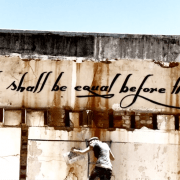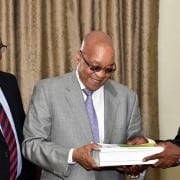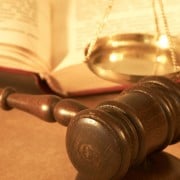|
Getting your Trinity Audio player ready...
|
As divided as South Africans were over his stepping down from office in February this year, so are they once more over former president Jacob Zuma’s corruption trial, which was postponed to 8 June in the Durban High Court on Friday.
Judge Themba Sishi adjourned the proceedings shortly after they started, following a request for postponement by prosecutor Billy Downer. Meanwhile, Zuma wants to bring a review application in terms of the national director of public prosecutions (NDPP) Shaun Abrahams’s decision to reinstate charges against him after it was withdrawn – the review is expected to be filed on 15 May.
“Zuma continues his Stalingrad strategy,” tweeted News24’s editor-in-chief Adriaan Basson, adding that Zuma would challenge the case on two fronts. “First Zuma will review NDPP’s decision to prosecute. If this fails he will ask court to stay prosecution.”
Crowds of Zuma’s supporters held a night vigil in Durban on Thursday night, while commentary from political and social analysts was streaming through broadcast and social media. News reports expected supporters to be in their thousands on Friday morning outside court. Among them are religious and business leaders who have decried what they view as the purging of Zuma by his political rivals and the judiciary.
Zuma faces 16 charges, two of which are for corruption, relating to his alleged pocketing of millions linked to the government’s arms deal in 1999, and handled by his former financial adviser Schabir Shaik. In 2005 Judge Hillary Squires found Shaik guilty on two counts of fraud and one of corruption for taking a bribe from arms maker Thompson CSF (now Thales Group). Shaik was a director in several companies that benefitted in one way or another from the arms deal. Squires noted, in his judgment, a corrupt relationship between him and Zuma.
Charges reinstated
Abrahams announced on 16 March that the charges against Zuma – formerly dropped by then acting head Mokotedi Mpshe in 2009 – would be reinstated. Mpshe had cited political interference in the investigation into Zuma, as the reason for the charges being dropped.
He added that the charges are as follows: one count of racketeering, two counts of corruption, one count of money laundering and 12 counts of fraud. He was of the view that there are reasonable prospects of a successful prosecution of Zuma.
“The reality is that Jacob Zuma should find himself in jail,” said former ANC MP Andrew Feinstein in an interview with AFP on Thursday, reported News24. Feinstein has campaigned for more than a decade for Zuma’s corruption case to come to court. His is also one of the over 200 names on the state’s list of potential witnesses.
Zuma is accused of taking bribes from Thales over a contract worth R30-billion during his time as MEC of economic development in KwaZulu-Natal and then deputy ANC president. Through a company owned partly by Shaik, and allegedly also by Zuma himself – Nkobi Group – the pair were to benefit from Thales winning a bid for one of the contracts in the arms deal.
The transactions happened at the time when Zuma was MEC, and by the time of Shaik’s conviction, he had become deputy president under Thabo Mbeki. Following the Shaik trial, Zuma was dismissed by Mbeki.
A key piece of evidence for the prosecution in the Shaik case was a fax signed by Alain Thetard, a manager at the South African affiliate of Thales. The fax allegedly describes an agreement reached with Zuma that the former president would protect those involved in the venture from any investigation. In exchange, Zuma would receive R500 000 per year. Thales, which supplied naval vessels as part of the deal, will also be charged with corruption and company representatives are expected to appear in court alongside Zuma. The fax is also expected to be brought back as evidence in this case.
Meanwhile, the ANC national executive committee has instructed members who do attend court in support of Zuma to refrain from wearing party colours or regalia, “creating the false impression that the ANC as an organisation identifies with, or approves of, the misdemeanours of which any member or leader may be accused.”








